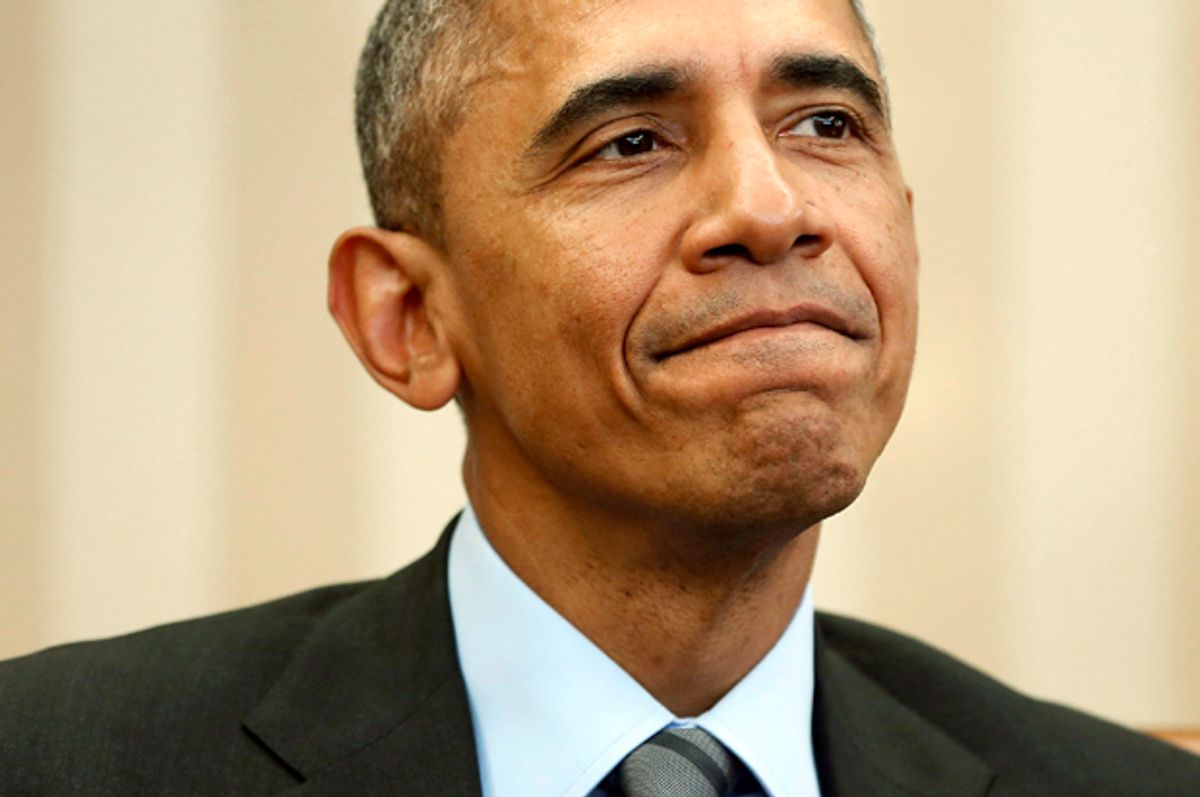With the Paris final talks entering their final week, it is worth noting the surreal disconnect between all the international handwringing over the abstract global warming accord and the reality that the U.S., Britain, France and Russia are bombing Syria’s oil fields into the stone age.
Even while the leaders of these nations pose as green stewards of the planet, making carbon reduction promises not even legally binding a generation from now, their bombers are pounding a country that with every additional air sortie becomes more of an oil soaked dead zone.
“These kinds of military activities are exempt from environmental review and the National Environmental Policy Act,” says Michael Edelstein, professor of environmental psychology at Ramapo College and author of “Contaminated Communities” and “Disaster by Design.”
“This becomes a form of acceptable collateral damage but it generates a long term ecological degradation that can lead to the death of a place," Edelstein explains.
Here at home we fret over separating our recyclables and getting permits to fill our backyard wetlands. Meanwhile, overseas we are blowing up oil fields and continue to pummel the most stressed parts of the planet with bombs to make ourselves “more secure.”
Yes, ISIS has to be defeated, but you can’t do it in a way that insures the only future for Syrians is not in their native land, but in filling Germany’s workforce requirements.
We can’t ignore the gathering clouds of regional military conflicts that extend across several countries and two continents already feeling the impacts of global warming and the disruption of agriculture it brings. These forces of disequilibrium, violence and environmental destruction, have a synergy and we can’t get ahead of it until we understand how the two feed each other.
Last year even the Pentagon recognized this when they classified climate change as a “threat multiplier.”
Years before the Syrian civil war started, that country was feeling the combined impact of a long term decline in rain fall and poor land use policy on the Badia steppe rangelands, which make up 45 percent of Syria’s landmass.
For generations, nomadic Bedouin tribes were able to not only sustain themselves, but supply urban centers with meat products produced on this vast portion of Syria that got little rainfall. Post-World War II, this sustainable model of existence, which had viable for centuries, was upended by central state planners. The system of tribal grazing rights broke down and the fragile land was caught up in a free-for-all where it was pressed beyond its carrying capacity.
The viability of these rangelands was undermined as they were pressed into agriculture that the region could not sustain. Livestock farmers, once able to just let their flocks graze in rotation, increasingly turned to transporting in water and feed to sustain their stocks. With the exponential increase in motor vehicles and farm machinery traffic, the subtle balance between human intervention and nature was lost.
By the 1980s, the government had recognized that its land management policies had been misguided and worked with international aid groups to try and reverse course, but the damage had already been done. By the time a massive drought from 2006 until 2011 kicked in Syria had little resilience left.
Decades of bad land use policy, population growth and the emerging impacts of global warming, with its dramatic decline in rainfall, all combined to send Syria’s agricultural sector into a tailspin. As a consequence, hundreds of thousands of now-idle rural residents streamed into urban centers already over crowded with a million Iraqi refugees. Food prices spiked dramatically higher.
As reported in the March 2015 edition of the Scientific American, a study by the National Academy of Sciences documented that while global warming did not cause the Syrian civl war, the “human induced drying,” along with the prolonged drought, set the stage for tensions to cascade into a widespread violent conflict.
Similar conditions exist in other parts of the Mid-East and sub-Saharan Africa where military conflict in places like Yemen make a bad situation even worse. As entire populations becomes increasingly dependent on imported food to survive, they become increasingly vulnerable to predatory pricing and supply disruptions.
Unless the environmental movement has the courage to make these connections it will continue be co-opted by political leaders who will use it to divert attention from the wars they are waging, which are not only accelerating global warming, but spreading the very terrorism they say they are fighting to stop.
What human experience has shown us is that only responding to violence with more violence alone does nothing but fuel more violence. This was true in the case of our over-the-top response to the September 11th attack, when we started two wars in two nations while launching drone attacks in several others. The results: Our war on terror has metastasized into a global conflict playing out from San Bernardino to Baghdad.
In his address to the Paris conference President Obama, painted a grim picture of a planet on the precipice of a global cataclysm. In his fierce urgency of now voice he described Alaska as a place where the sea was “already swallowing villages and eroding shorelines: where permafrost thaws and the tundra burns; where glaciers are melting at a pace unprecedented in modern times.”
Obama made a global extrapolation of the ecological and social crisis climate change would cause in the future. “Abandoned cities, fields that no longer grow” Obama predicted “political disruptions" that would “trigger new conflict, and even more floods of desperate people seeking the sanctuary of nations not their own.”
How is that any different from the here and now of the world being shaped by our never ending war on terrorism?

Shares